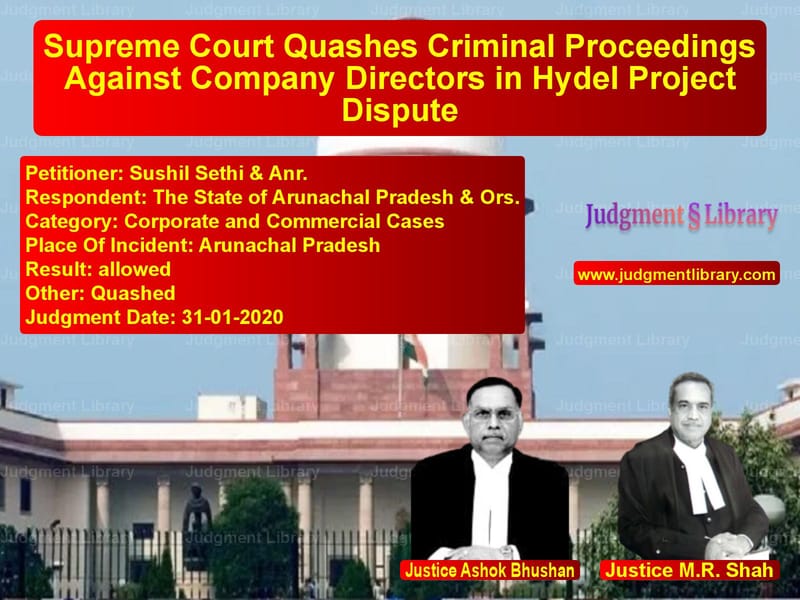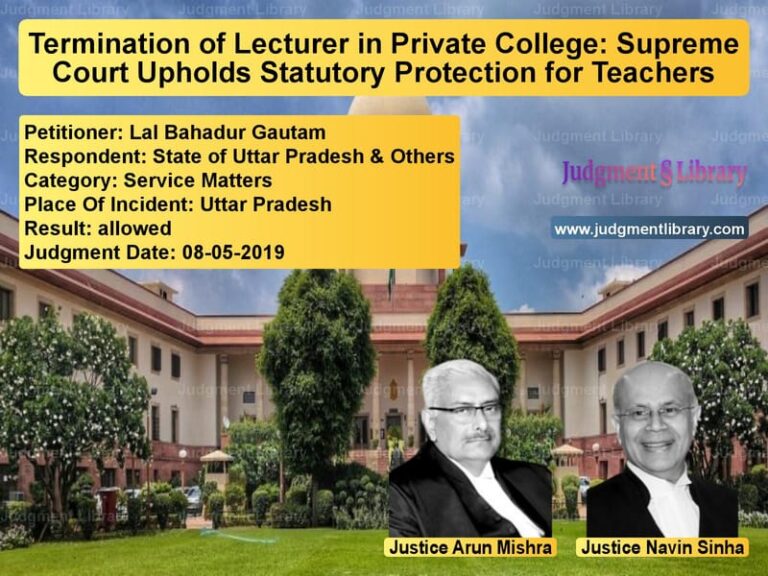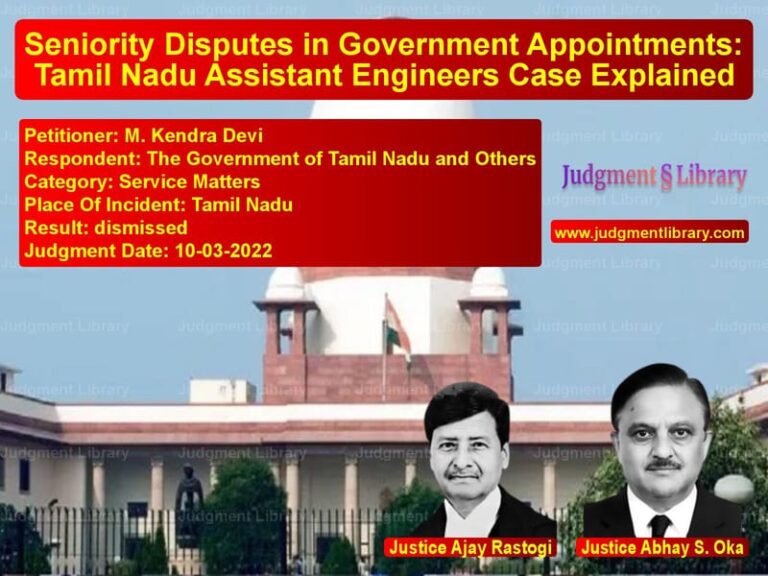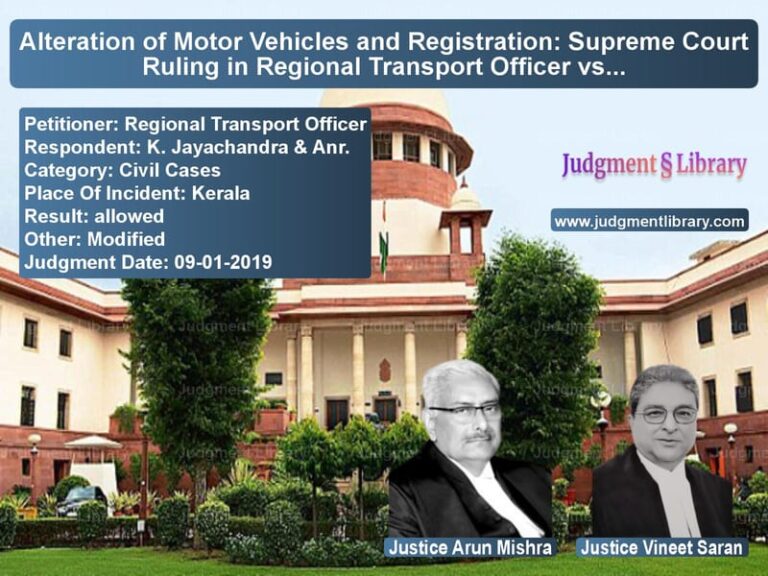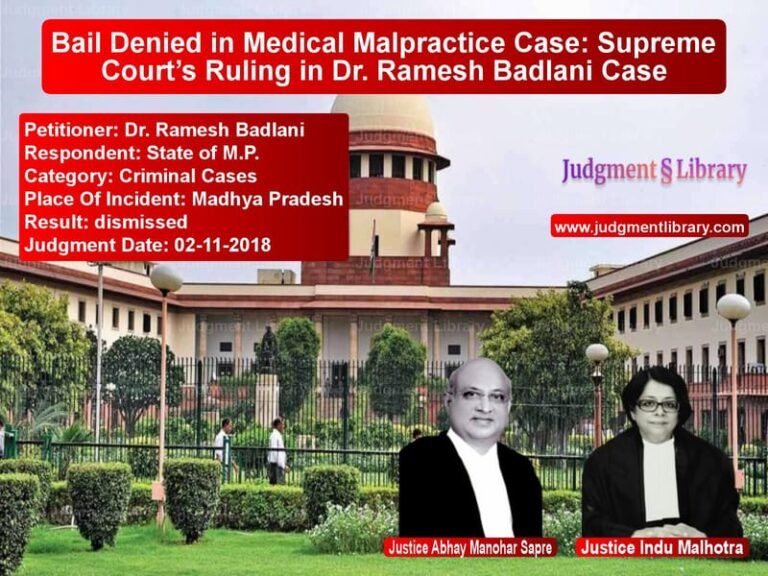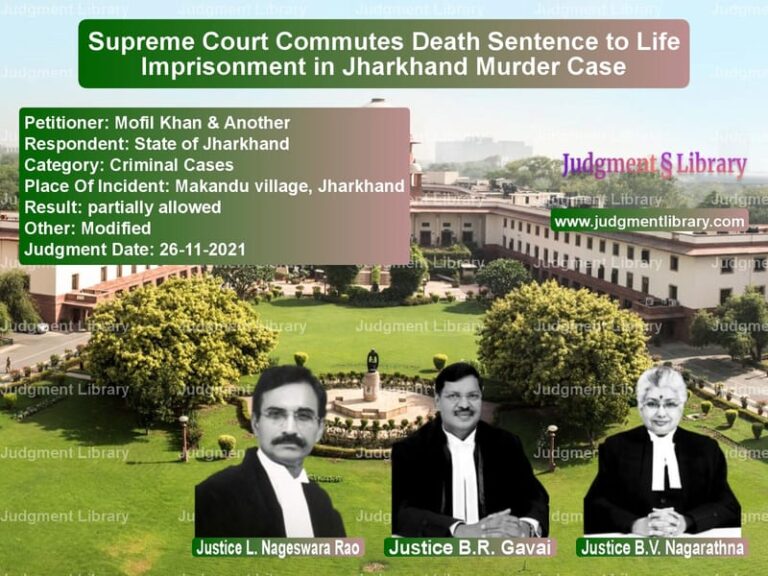Supreme Court Quashes Criminal Proceedings Against Company Directors in Hydel Project Dispute
The Supreme Court of India recently ruled in the case of Sushil Sethi & Anr. vs. The State of Arunachal Pradesh & Ors., quashing criminal proceedings against two directors of M/s SPML Infra Limited. The case revolved around allegations of cheating and criminal conspiracy under Sections 420 and 120B of the IPC, related to the supply of allegedly substandard materials for the Nurang Hydel Power Project.
Background of the Case
The dispute originated from a contract signed on March 18, 1993, between the Government of Arunachal Pradesh and M/s SPML Infra Limited for the construction, supply, and commissioning of the Nurang Hydel Power Project. The contract was valued at approximately Rs. 24.96 crores and included three power-generating units.
Key details of the project:
- The project was commissioned in July 1996.
- The defect liability period was set for 18 months, expiring in January 1998.
- The project remained operational, generating 90 lakh KW units by September 20, 1998.
- The company issued a notice on March 9, 2000, asking the government to take over the project due to non-payment of maintenance charges.
Following this, the government lodged a complaint alleging that M/s SPML Infra Limited had provided inferior quality materials that did not conform to the agreed specifications. Specifically, it was alleged that the supplied turbines contained lower-than-required nickel and chromium levels, leading to turbine failures.
Legal Proceedings and Investigations
The complaint led to the registration of Jang PS Case No. 05/2000 against the appellants and other officials. The allegations were:
- The supplied turbines were defective, leading to recurrent damage.
- Testing at the National Test House, Calcutta, confirmed non-conformity with agreed specifications.
- The company and government officials engaged in a criminal conspiracy to defraud the government.
- The company charged Rs. 5.18 crore for turbines, while their actual cost was Rs. 1.61 crore, leading to an alleged overcharge of Rs. 3.57 crore.
The police filed a chargesheet on May 28, 2004, under Sections 420 and 120B IPC. However, the appellants (directors of the company) claimed they were unaware of the charges until 2017.
Arguments by the Appellants
The directors of M/s SPML Infra Limited sought to quash the charges against them, arguing:
- The dispute was a civil contract issue, wrongly criminalized.
- The company had replaced the defective turbines in 2000, despite the defect liability period having expired.
- The government continued using the turbines, and the project remains operational.
- The company itself was not named as an accused, making it unlawful to prosecute only the directors.
- There was no fraudulent intent from the inception of the contract.
- They were issued summons 13 years after the chargesheet was filed, leading to undue harassment.
Arguments by the Respondents
The government countered that:
- The directors knowingly supplied substandard materials and overcharged for them.
- There was sufficient evidence of criminal conspiracy under Section 120B IPC.
- The replacement of defective turbines did not absolve the accused of liability.
- The directors, being responsible for the company’s operations, were vicariously liable.
- The criminal case should proceed to trial instead of being quashed at the preliminary stage.
Supreme Court’s Observations
1. Criminalizing Civil Disputes
The Supreme Court emphasized that a mere breach of contract does not constitute a criminal offense unless there was fraudulent intent from the outset.
“A dispute arising from a contract should be resolved in a civil court or through arbitration. Converting such disputes into criminal cases would open floodgates for unnecessary criminal litigation.”
2. Lack of Fraudulent Intent
The Court noted that the government continued using the turbines and issued satisfaction certificates in 1997, long before filing the FIR in 2000.
“If the appellants intended to cheat the government, they would not have replaced the turbines or continued maintaining the project even after the defect liability period.”
3. Summoning the Directors Without Naming the Company
The Court found it legally untenable that the company itself was not named as an accused.
“The directors cannot be prosecuted when the company they represent has not been arrayed as an accused. Vicarious liability does not arise in such cases unless specifically provided in law.”
4. Undue Delay in Proceedings
The Court found the 13-year delay in summoning the accused unjustified.
“Allowing such prolonged prosecution would amount to harassment and violate the accused’s right to a fair trial.”
Final Judgment
The Supreme Court ruled:
- The criminal proceedings against the appellants were quashed.
- The charges under Sections 420 and 120B IPC were dismissed.
- The ruling applied only to the appellants and not to other accused individuals.
- The government was free to pursue a civil claim if necessary.
Implications of the Judgment
The ruling has significant implications for commercial contracts and criminal liability:
- Contractual disputes should not be criminalized unless there is clear evidence of fraud.
- Company directors cannot be prosecuted without naming the company as an accused.
- Delays in filing and pursuing cases can lead to quashing of charges.
- The judgment protects businesses from malicious criminal prosecution in commercial disputes.
Conclusion
The Supreme Court’s decision reinforces the principle that criminal law should not be misused to settle civil disputes. By quashing the criminal proceedings, the Court has safeguarded the rights of business executives and reaffirmed the importance of distinguishing between contractual breaches and criminal offenses.
Petitioner Name: Sushil Sethi & Anr..Respondent Name: The State of Arunachal Pradesh & Ors..Judgment By: Justice Ashok Bhushan, Justice M.R. Shah.Place Of Incident: Arunachal Pradesh.Judgment Date: 31-01-2020.
Don’t miss out on the full details! Download the complete judgment in PDF format below and gain valuable insights instantly!
Download Judgment: Sushil Sethi & Anr. vs The State of Arunach Supreme Court of India Judgment Dated 31-01-2020.pdf
Direct Downlaod Judgment: Direct downlaod this Judgment
See all petitions in Company Law
See all petitions in Corporate Compliance
See all petitions in unfair trade practices
See all petitions in Judgment by Ashok Bhushan
See all petitions in Judgment by Mukeshkumar Rasikbhai Shah
See all petitions in allowed
See all petitions in Quashed
See all petitions in supreme court of India judgments January 2020
See all petitions in 2020 judgments
See all posts in Corporate and Commercial Cases Category
See all allowed petitions in Corporate and Commercial Cases Category
See all Dismissed petitions in Corporate and Commercial Cases Category
See all partially allowed petitions in Corporate and Commercial Cases Category

